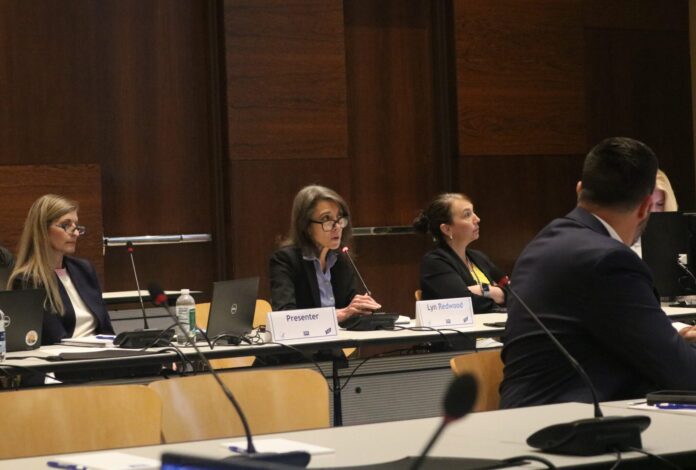
(Georgia Recorder) — The Centers for Disease Control and Prevention’s key vaccine panel has voted 5-1 to ban thimerosal, a harmless preservative used in a small portion of flu vaccines, in what critics say is a nod to vaccine skeptics who have fixated on the chemical’s use.
The move rescinds recommendations for flu vaccines containing thimerosal for children, pregnant women, and the general public. The CDC’s research shows no adverse impacts caused by the chemical.
The Advisory Committee on Immunization Practices also voted 5-2 to approve a monoclonal antibody shot manufactured by Merck to protect infants younger than eight months from respiratory syncytial virus (RSV), 7-0 to add RSV to a program that provides free vaccines to children whose families can’t afford them, and 6-0 to approve the annual flu vaccine for everyone older than six months.
The committee, which was established in 1964, is charged with setting national guidelines around which people should be vaccinated against a plethora of preventable diseases and when those vaccines should be administered. The recommendations also play a key role in determining which vaccines insurance companies are willing to cover and how accessible immunizations are for the public to access. They also help guide global immunization practices.
This week’s meeting is ACIP’s first since U.S. Health Secretary Robert F. Kennedy Jr. dismissed all 17 members of the committee and replaced them with a slate of eight hand-picked appointees, several of whom are seen as vaccine skeptics.
Though certain members of the committee have embraced the label of anti-vaxxer, committee Chair Martin Kulldorff has objected to the characterization, and emphasized the need to build public confidence in the CDC’s recommendations.
“Our central duty is to protect public health, and we understand that we must answer the call for re-establishing confidence in the scientific examination process,” the committee members said in a joint statement.
“We came to this meeting with no predetermined ideas, and will make judgments as if we are treating our own families.”
The votes also offered insights into individual members of the committee’s stance on vaccines. Dr. Cody Meissner, a professor of pediatrics and medicine at Dartmouth College’s Geisel School of Medicine who has served as a past committee member, cast the sole “no” vote on the thimerosal ban.
“The risk from influenza is so much greater than the nonexistent, as far as I know, risk from thimerosal,” he said.
Vicky Pebsworth, a registered nurse and board member of the National Vaccine Information Center, which advocates for vaccine exemptions, abstained from voting.
A controversial ingredient
Thimerosal, a mercury-derived antiseptic, has been used since the 1930s to guard against harmful fungi and bacteria in vaccines. The chemical was removed from all childhood vaccines in the U.S. by 2001 and today, only 4% of flu vaccines administered — those used in multi-dose vials — contain the compound. However, antivaccine activists have seized on thimerosal, citing unfounded arguments that link the chemical to autism and other adverse health outcomes.
Thursday’s vote to ban thimerosal from flu shots came shortly after Lyn Redwood, the former head of Kennedy’s anti-vaccine group Children’s Health Defense, delivered a presentation to the committee centered on the ingredient. Redwood, who has long echoed conspiracy theories about vaccines, was recently hired by Kennedy to help oversee vaccine safety at the CDC, the Washington Post reported Wednesday. The U.S. Department of Health and Human Services directory now lists Redwood as an employee.
Redwood’s presentation argued that thimerosal has been shown to cause autism, though there is no scientific evidence to support the claim. An early draft of her slides claiming that thimerosal can cause “long-term consequences in the brain,” cited a study that does not appear to exist. The draft was later removed and replaced with a version that does not include the fabricated citation.
The CDC’s own research has shown no connection between thimerosal and autism or any other potential harm. The chemical is not frequently used in U.S.-administered vaccines, but remains common in most vaccines around the world.
Jodie Guest, who serves as the senior vice chair of Emory University’s epidemiology department and as a faculty member on the CDC’s Epidemic Intelligence Service (EIS) program, criticized the committee’s emphasis on “revisiting settled science” in an effort to appease vaccine skeptics.
“Revisiting [thimerosal] and taking it out of the very few vaccines that’s left in is really scientifically not a huge problem,” Guest said. “But from a communication perspective, it continues to propagate the concept that there is a relationship between it and neurological disorders.”
There are certain situations in which using a vaccine that contains thimerosal may be a more practical choice, Guest said. Multi-vial doses of vaccines are cheaper to produce, and are more likely to be used in rural areas where vaccines are administered less frequently.
“Our underserved communities are the places where we are more likely to see the multi-dose vials for the flu vaccine, and that’s where thimerosal still exists,” Guest said. “It was put into multi-dose vials in order to not have bacterial infections inside of the vaccine vials that were then given to patients. So it’s a protection and it’s scientifically sound to continue to use it.”
Georgia, which has a large rural population, rural health care shortages and low vaccination rates, could be disproportionately impacted by any messaging that casts doubt on the safety and efficacy of vaccines, Guest added.
“Anything that makes it harder to find a flu vaccine or to get one — or makes you question how safe they are — will drive our numbers down,” she said.






